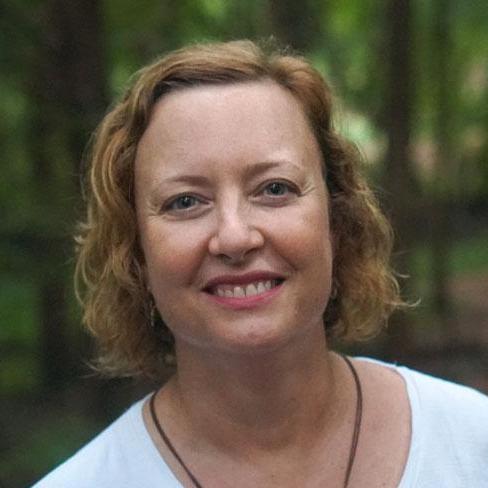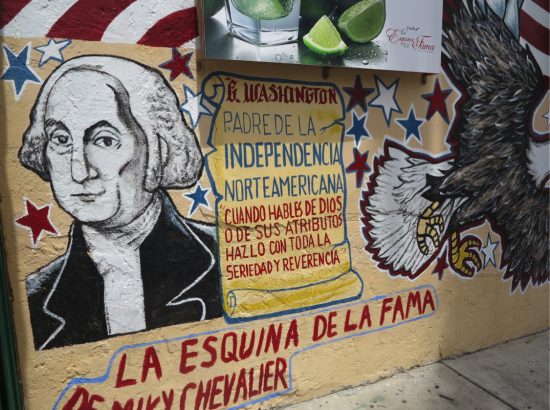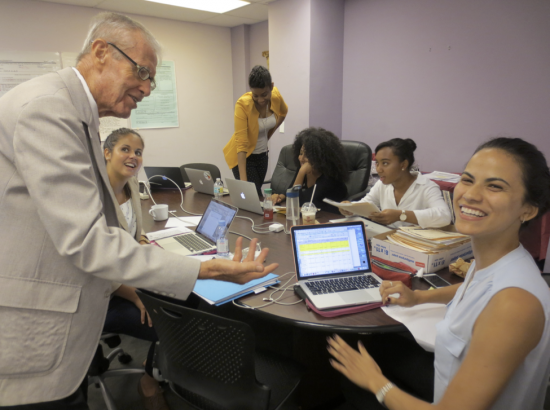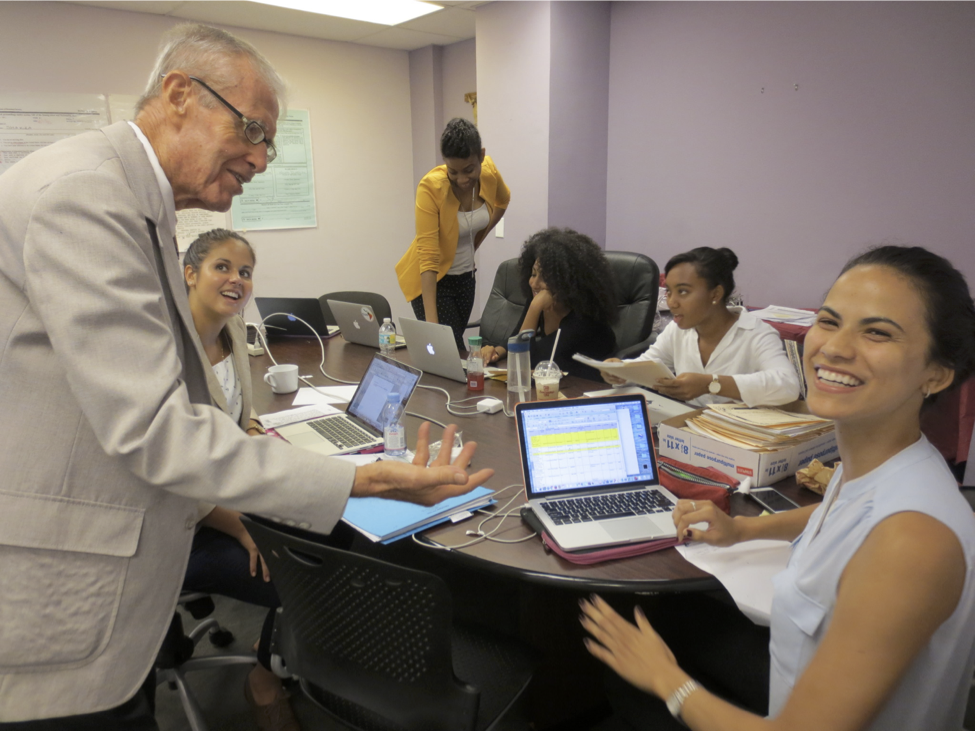
Overview
During their two months in DukeEngage Miami, students will work with nonprofit organizations that provide services to the multi-ethnic Miami-Dade area, a county with a 54 percent foreign-born population. The nonprofits with which students work focus on social issues such as immigration and refugee legal status, domestic violence, housing issues, and cultural expression.
The Miami site was chosen because of its diverse immigrant communities. The program is subtitled “The Many Faces of Miami.” By this we refer to all of the following: Miami as a U.S. city nicknamed “the capital of Latin America;” Miami as one of the highest-percentage-Spanish-speaking cities in the U.S.; Miami as home to several distinct waves of Cuban-American immigrants; Haitian-American immigrants; Miami more recently as a global city, flavored by immigration from Latin America as a whole and from the Caribbean specifically; Miami as socioeconomically diverse; Miami as a Duke alumni home and network; Miami as a place of interesting politics, art, cuisine, and culture as well as exciting international entrepreneurship and law. Throughout our program, we will explore and reflect on these many faces together.
Students will broaden their perspectives on diversity, legal and public policy issues, language, and culture; improve interpersonal skills; develop civic responsibility through active community involvement; and become comfortable working with cultures other than their own.
Community Partnerships
Each summer the work changes depending on the needs of the organizations and the language abilities of the students. Students who are able to speak Spanish, Haitian Creole, or French generally gain more direct access to clients, but English speakers are also able to contribute with other skills. In 2025, DukeEngage students may work with the following organizations, though partnerships might be modified according to the needs of the organization:*
- Americans for Immigrant Justice (2 interns): AI Justice works to protect basic human rights of immigrants through a unique combination of free direct services, impact litigation, policy reform, and public education at local, state, and national levels. Students might work in the Family Defense Program, Domestic Violence & Human Trafficking (Lucha) Program, Children’s Legal Program, Detention Program, Litigation Program, or Pro Bono Program assisting with interviews (ex. Naturalization clinics), research, education, site visits, and accompanying clients in court. Students will work 2 days in-person in the office and 3 days remotely.
- Catholic Charities Legal Services (3-4 interns): Students will work directly with lawyers and support staff, representing low-income people seeking immigration relief for themselves or others, immigration status, or Naturalization. Students may prepare country profiles, perform intake interviews, translate documents, interpret for lawyers, and/or assist with grant writing.
- Dade County Legal Aid (1-2 interns): Students will observe dependency court proceedings in children’s court virtually or in person, will assist in the recruitment of pro bono children’s lawyers, the referring and placement of children’s cases, and the marketing and social media of staff, community events, and pro bono heroes. Students will also work with the guardianship department that assists families of persons with disabilities. and will correspond with low-income families of adults with disabilities in a variety of contexts including social services, housing, and legal representation. Spanish speaking preferred.
- Legal Services of Greater Miami, Inc. (2-4 interns): Legal Services of Greater Miami is a non-profit law firm that advocates to remove legal barriers to economic prosperity and to achieve a more just and equitable community. Students will assist attorneys with activities related to housing and tenants’ rights such as: research, motions, case reviews and intake interviews. Students may have the opportunity to attend hearings, participate in training programs, and assist with clinics in the community. Generally, work will be completed in-person in the office, but some remote virtual or field work could be requested.
- Perez Art Museum Miami (PAMM) (2-3 interns): During the course of 8 weeks, interns will work collaboratively and on a rotating basis with PAMM Staff members from different departments and support with daily administrative tasks and special projects. Some of these museum departments may include Curatorial, Collection Management, Development, Retail, Visitor Services, Human Resources, IT, Finance, Special Events, Education, Digital Engagement or Marketing. Through administrative work assignments and projects, the intern will further develop important skills such as time management, communication, teamwork, collaboration, accountability, and leadership. The intern will also have the opportunity to network with PAMM employees and learn about career paths through brown bag lunch meetings.
* updated 11/13/24
Program Requirements
Language: Second language proficiency is very beneficial though not required. Preference will be given to students with intermediate to advanced Spanish, Haitian Creole, or French.
Coursework: Preference will be given to students who have taken courses related to immigration, Latino/a or Latin American & Caribbean Studies, languages mentioned above, cultural competency, public policy, law, human rights, social justice, or political science.
Skills: Depending on the placement, social media skills, experience with low-income and/or immigrant communities, and previous civic engagement work are desirable.
Personal Qualities:
- Teamwork: Since students will be working with many people they have never met before, it’s important they know how to cooperate with others to get the work done (team effort).
- Patience: This is the key for people to adapt to a different climate as well as a different work environment, especially in an area where people may speak Spanish more than English.
- Communication skills: The capacity to work things out with others respectfully.
- Responsibility: Be responsible to get the task assigned to you well done. Be on time and a full participant in all scheduled events.
- Motivation: Students should be ready to take initiative, going above and beyond the tasks assigned to them.
Logistics
Housing, meals, and transportation: Students will be housed at the University of Miami campus. Students will receive a stipend for their meals and will either prepare their own food or dine on campus. As far as transportation is concerned, students will travel to and from their workplaces via public transit (a 35-45-minute train ride).
Local safety, security, and cultural norms: If you have special needs related to health, culture, disability, or religious practices, we encourage you to contact the program director(s) or the DukeEngage office to discuss whether your needs can be accommodated in this program.
For guidance on how race, religion, sexual/gender identity, ability, or other aspects of identity might impact your travels, we suggest exploring the Diversity, Identity and Global Travel section of the DukeEngage website.
Academic Connections
This program is open to all, and might especially appeal to students taking language courses such as Spanish, Haitian Creole, and French as well most classes in the field of Humanities.
Students who participate in this program might go on to pursue courses, certificates, research projects, etc. in the Department of Romance Studies, the Humanities, and in Law. However, students will be well prepared through this program to undertake any career that prioritize the needs of people over profits.
DukeEngage cannot guarantee that any program will occur. Dates and program details are subject to change, and programs may be cancelled for various reasons, including geopolitical or public health issues.
Student Reflections from 2022
-
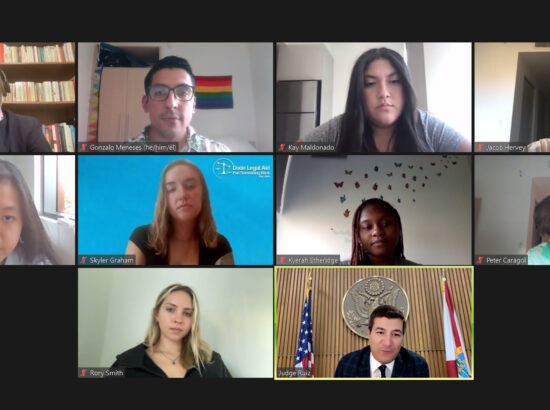
Life Trapped in a Folder: Part II
Published by Kay MaldonadoIntroduction: Rory Smith and Kay Maldonado From the moment we walked into Catholic Charities Legal Services, we could tell there …Read more -
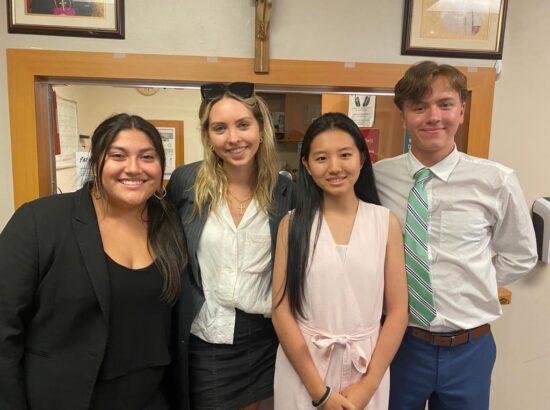
Life Trapped in a Folder: Part I
Published by Rory SmithIntroduction: Rory Smith and Kay Maldonado From the moment we walked into Catholic Charities Legal Services, we could tell there …Read more


